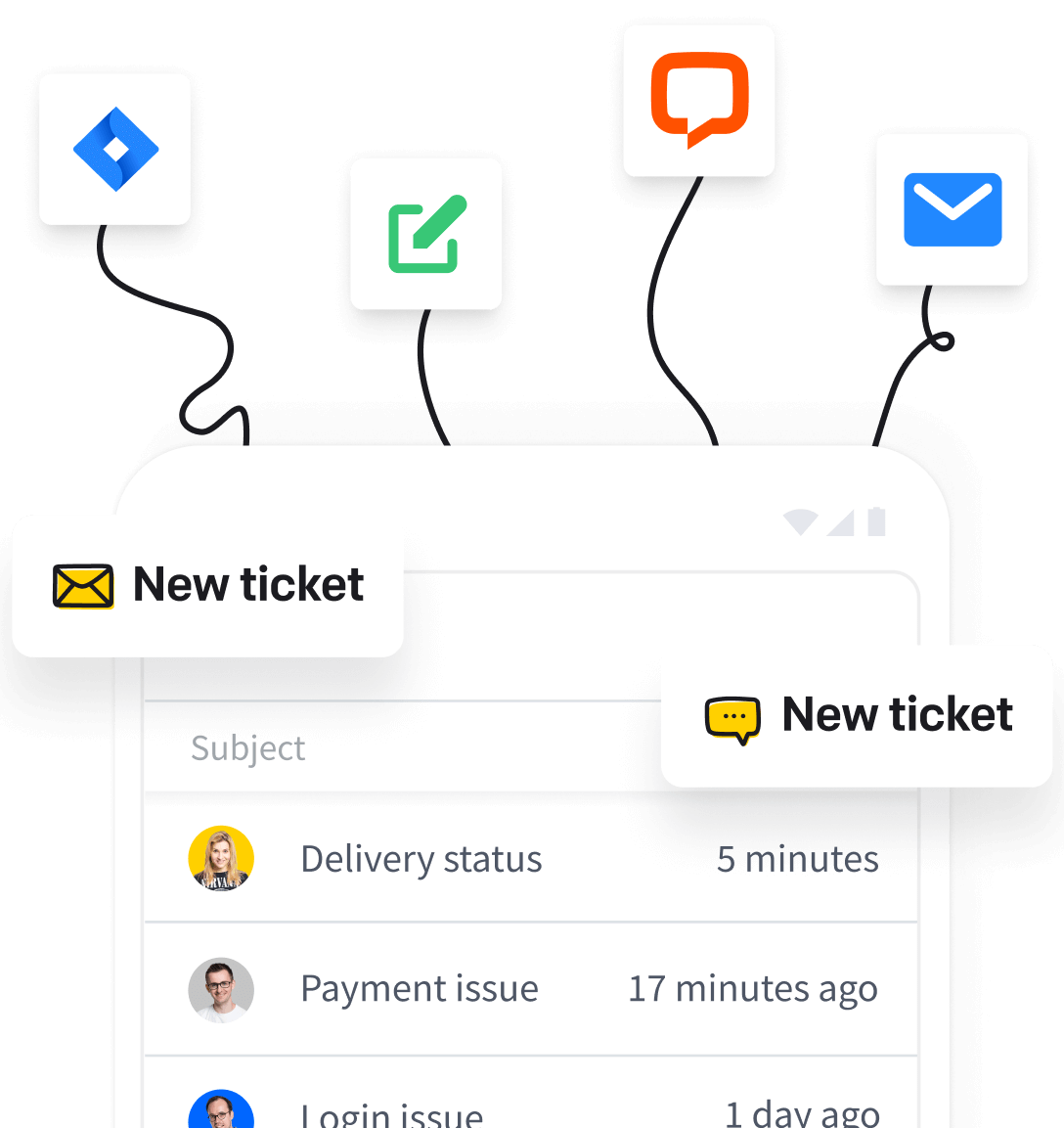Change is inevitable. So, to stay ahead in any industry, you must regularly change your business plans, processes, and strategies to stand out in the market.
However, getting your employees and other stakeholders to accept and adapt to new changes can be frustrating and impact operational efficiency. This is where change management software comes into play.
Software solutions are available to help you manage and control change efficiently, leading to enhanced collaboration among team members. Change management software facilitates structured decision-making, which ultimately contributes to the success of your business.
This article presents the best change management solutions, benefits, and key features. Read on to learn more.
What is change management software?
Change management software is a tool that helps you plan, execute, and track changes within an organization. It helps optimize switching to new technologies and implementing new processes in organizational functions.
A change management tool aims to identify roadblocks during the adoption of the change to minimize disruptions. Businesses leverage change management technology to effectively communicate switches with employees, ensuring everyone is on the same page.
When to use change management software
Let’s see some examples of when you should consider using a change management process.
Organizational restructuring
Change management tools are helpful during organizational restructuring, like mergers, job roles change, and new acquisitions. They align all stakeholders on the changes made, along with helping employees get accustomed to their new responsibilities without feeling overwhelmed.
Software implementation
That tool is crucial when introducing new software systems in your organization or updating existing ones. It might be helpful in user training, addressing resistance, and assessing the impact of new technology on overall workflow.
Policy and process changes
It’s important to update your business processes and policies. Change management platforms can be used to document and communicate these changes, as well as to ensure better compliance.
Want to better communicate with your team? 🗣️Check the HelpDesk blog post "Communication Tools" and master your team management. 📚

Difference between change management and project management software
It’s a common misconception that change management and project management software have the same purpose. However, these two software applications are different and used for distinct functions.
Project management software vs. change management software
As the name suggests, project management tools refer to tools that assist in planning, organizing, and managing tasks and resources to complete a project within a given timeframe.
These tools are primarily used to ensure projects are completed within the allocated resources and budget while meeting industry standards. Change management software, on the other hand, focuses on planning, managing, and executing organizational changes.
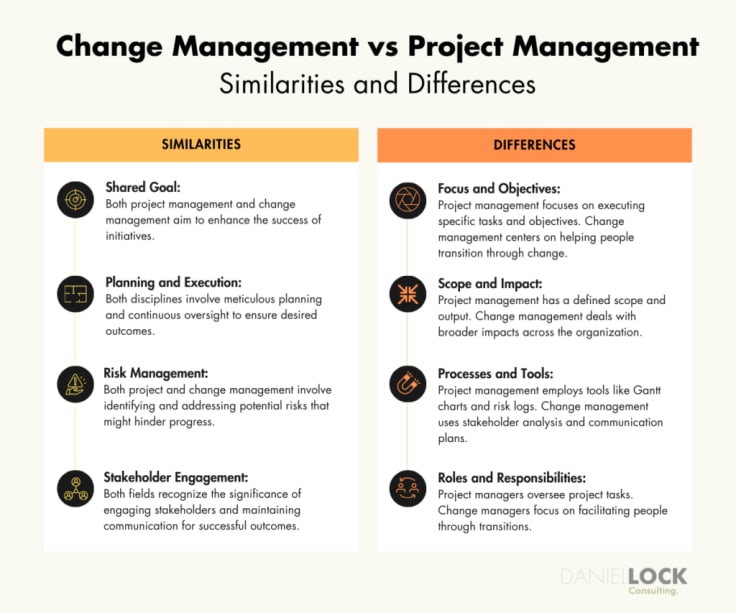
Benefits of change management software
Change management software offers many benefits to businesses. That’s why more organizations are investing in this solution. The overall market size of change management tools is expected to reach $1018.59 million by 2031 at a CAGR of 7.8% during the forecast period (source).
Improved communication
Change management solutions significantly improve communication within the organization. They act as a central hub where everyone can see what’s happening, ask questions, and share ideas. Features like real-time messaging and collaboration tools make announcing and implementing changes easier.
Stakeholders, including employees, IT teams, and external partners, are automatically updated about the new changes and updates.
Enhanced efficiency
With a change management tool, employees receive automatic notifications about any changes, eliminating the need for manual announcements that are usually inefficient.
This ensures that everyone has access to the latest information, updates, and documents, which reduces the time spent searching for relevant information.
Additionally, these software solutions automate many repetitive tasks, such as tracking analytics and collecting feedback. It can free up employees’ time, allowing them to focus on other more critical tasks.
Stakeholder engagement
Stakeholder or employee engagement is critical to driving your business toward success. Change management software is beneficial in this regard.
Through its real-time messaging, announcement boards, and discussion forums, all stakeholders, like employees, management, and partners, can ask questions and voice their concerns. This is useful in solving problems and creating a positive environment where everyone can participate in decision-making.
Key features of change management software
Now that you know the benefits of change management solutions, it’s time to discuss its key features.
Change tracking
Firstly, change management software provides excellent change-tracking capabilities. It enables process mapping, which allows you to track the tasks and phases involved in a change.
This software also enables managers to easily monitor if team members adapt to the changes and perform well. Based on the results, managers can make necessary adjustments to optimize the team’s efficiency.
Workflow automation
Another feature is workflow automation. Most software has tools that make it easy for managers to automate routine tasks.
These include sending notifications, collecting data, and performing change management approval processes. Automation reduces errors and saves the precious time of management and employees.
Speed up your customer service with HelpDesk automation. Try a free 14-day trial and boost your customer engagement. 🎉
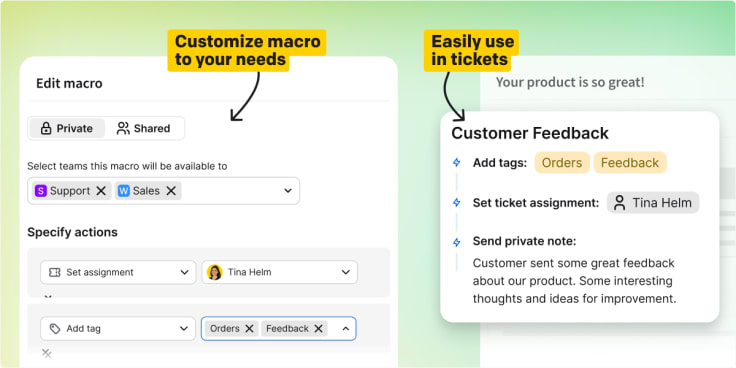
Stakeholder mapping
Change management solutions offer a stakeholder mapping feature that helps you identify key stakeholders most affected by the change. You can evaluate the stakeholders’ contributions to the change and determine how they will impact your organization.
This information enables organizations to communicate more effectively with stakeholders and helps them focus their efforts where it matters most. As a result, change management processes are smoother, and outcomes are better.
Analytics and reporting
Almost all change management applications provide real-time reporting and analytics features on how your employees are doing and the effectiveness of your changes. You can then identify areas for improvement and work on them to enhance the overall team performance.
Also, real-time analytics help you validate the results of your changes. You can also use them to get buy-ins from all involved parties.
Feedback collection
Feedback collection is significant to get detailed insights into the impact of changes. Organizational change management systems allow you to collect feedback from management, employees, and internal partners.
Feedback can be easily collected through channels like polls, comment sections, and survey options available in the software. It helps your organization identify areas for improvement and address any concerns and challenges that team members face due to the change.
12+ best change management software tools for 2025
Do you know that 72% of transformations fail because of inadequate management support for the change (33%) and employee resistance (39%)? (source) Unfortunately, it’s true! So, to help your business overcome such obstacles, you must invest in a change management app.
HelpDesk
Firstly, we have HelpDesk. Even though it’s not precisely change management software, HelpDesk is an excellent ticketing software that can help you manage your employees’ requests and issues. With top-rated communication tools, this software allows you to collaborate with your team quickly.
You can update them about the changes and get their feedback about what improvements need to be made to boost the overall efficiency. In addition, its AI-based features automate most tasks, such as tracking team performance and streamlining repetitive tasks.
It also routes tickets to the appropriate departments and provides quick responses to common queries. Customer service teams can use HelpDesk to reach customers efficiently, boosting satisfaction and contributing to organizational success.
Key features
-
Easy to configure automation and AI help desk features like automated ticket management and progress tracking.
-
Save canned responses to engage with customers and team members quickly.
-
Create dedicated teams of specific language and skills to solve queries.
-
Work with popular integrations like HubSpot, Zapier, Jira service management, and many more.

HelpDesk pricing
HelpDesk provides a free 14-day trial that allows you to test the platform before a long-term commitment. The pricing for the Team plan starts from $34/month.
Enhance your customer service performance. 💻 Join HelpDesk and try its AI features to automate repetitive tasks and focus on what matters. ✅
Freshservice
Freshservice is an online IT help desk that aims to manage service and change within an organization. This tool is equipped with great asset and ticket-tracking capabilities.
It also automates change approvals and notifications, updates the team, and saves time. You can easily use it to arrange meetings with the project change advisory board to plan the change process.
Key features
-
Collect data from the service desk to update teams about changes.
-
Automated change management approval process and notification.
-
Communication via live chats and AI-powered bots.
-
Multiple view options to check the progress of a change.
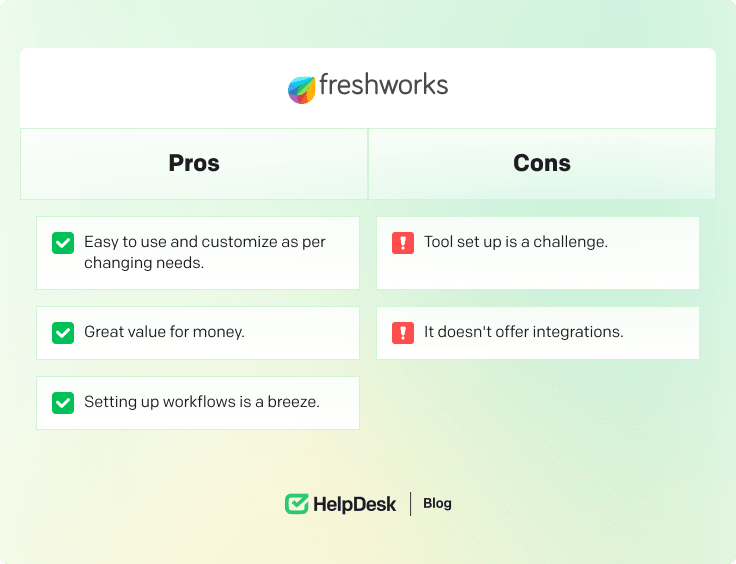
Freshservice pricing
Freshservice offers a free trial to check their functionalities before purchasing. However, pricing for the starter plan starts from $29/agent/month (billed monthly) or $19/agent/month (billed annually).
Viima
Next, we have Viima, another organizational change management system. It offers many ideation boards, each assigned to a change process.
Features like single sign-on and individual access control allow you to simultaneously implement and track various change processes. The dashboard and interface are very user-friendly, providing insights into the results of new methods and technology integration.
Viima also offers tools like commenting, liking, sharing, evaluation, and impact assessment to take the game to the next level. All stakeholders use them to share their reviews and queries, increasing transparency and engagement.
Key features
-
Built-in integrations like Google G Suite, Microsoft Teams, Office 365, and Jira.
-
Collaboration through commenting, liking, and evaluation features.
-
Mobile app for easy image uploading and conversation.
-
Multiple ideation boards for different change processes.

Viima pricing
Customers get a free trial, and the Basic Viima plan starts at $39/month, allowing ten users and offering three boards.
Wrike
Wrike is a versatile organizational change management software. This cloud-based tool provides complete visibility and control over your newly introduced change management processes. Project managers can use it to organize requirements, create plans, and visualize schedules with Gantt Charts.
As the project progresses, automated notifications are sent to all employees regarding the change. A personal dashboard feature gives each user an overview of their responsibilities. Real-time analytics and reporting allow you to make adjustments to maximize results.
Key features
-
Online file sharing and editing.
-
Real-time collaboration among employees.
-
2FA and SSO for advanced security.
-
Create custom reports for each project or department.
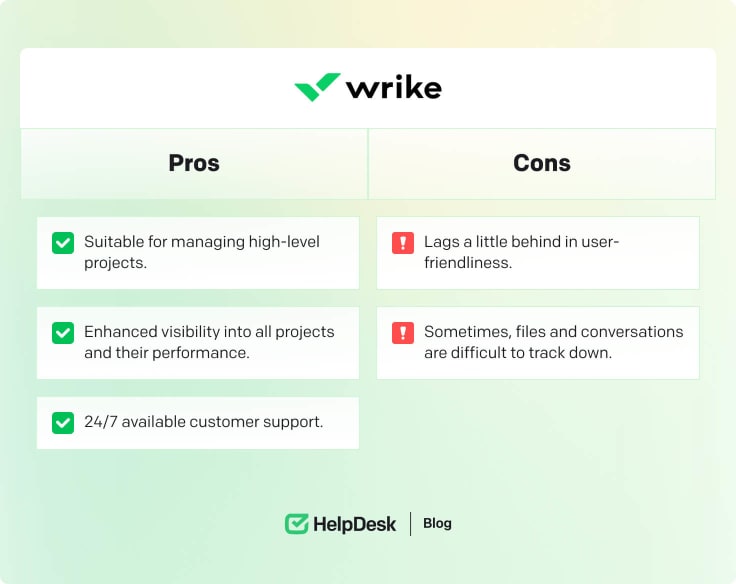
Wrike pricing
Wrike’s free plan is available for unlimited users, while the Team plan starts from $9.80/month.
Whatfix
If you are introducing new technologies in your organization or updating existing ones, Whatfix is needed. It’s a data-driven digital adoption platform (DAP) that can become an interactive overlay on top of other applications.
It guides your employees on using the new technology and making the most of it. Some pop-ups notify users about any updates or announcements on a project. This SaaS-based platform also helps in software release management, supports smooth employee onboarding, and has remote training features.
Key features
-
Product tours and step-by-step guides on the usage of new technology.
-
Self-support when users encounter issues.
-
SCORM and xAPI integrations for adding videos, PDFs, and slideshows.
-
Pre-created reports and analytics to monitor content usage.

Whatfix pricing
Whatfix also offers a free plan to its users, but it comes with limited features. To access its complete features, the pricing for the Basic plan is set at $1000/year.
Giva
Founded in 1999, Giva is one of the many exceptional change management solutions helping businesses worldwide. This platform includes everything like the ITIL help desk asset and knowledge management.
Giva’s KPIs and reporting are on the next level. It provides a complete overview of team productivity and responsiveness to change.
It’s also used to measure customer satisfaction. It has a mobile application that’s HIPAA compliant and smoothly runs on any browser.
Key features
-
Point-and-click customization without programming.
-
Robust reporting for quick measurement of team productivity.
-
Colorful dashboard with customizable charts and metrics for complete visibility into critical issues.
-
HIPAA-compliant mobile app for viewing, managing, and prioritizing tickets on the go.
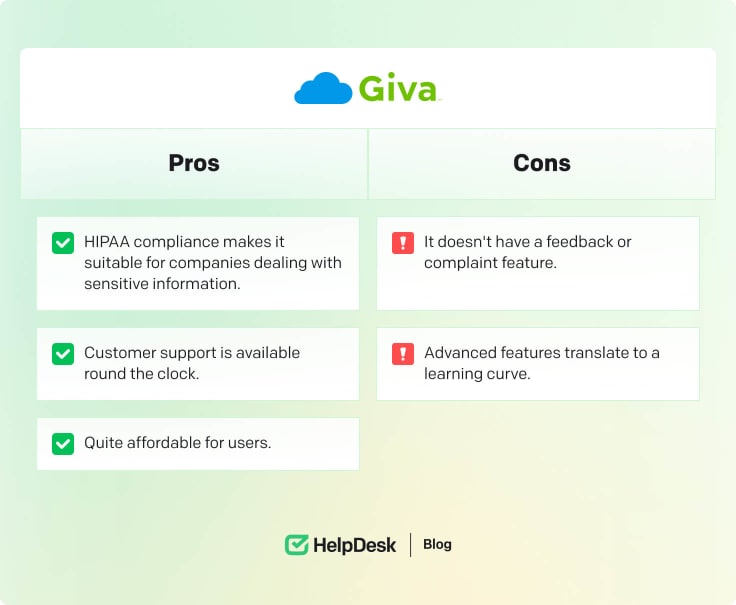
Giva pricing
Unfortunately, Giva doesn’t offer a free trial to its users. You must pay $49/month per user to access the software features.
ServiceDesk Plus
ServiceDesk is synonymous with handling a change management process. It’s an IT management software that helps both employees and customers.
With over 10,000 users and availability in 23 languages, this platform is helpful for efficient ticket resolution. This solution also tracks inventory in Windows and Linux workstations. The AI and ML algorithms track team performance over time, while the presence of a customizable self-service support system is a sigh of relief for end users.
Key features
-
iPhone app available for easy access anytime, anywhere.
-
Web-based portal for issues or complaint submission.
-
Update on ticket status via email or SMS.
-
Advanced performance tracking and customization capabilities.
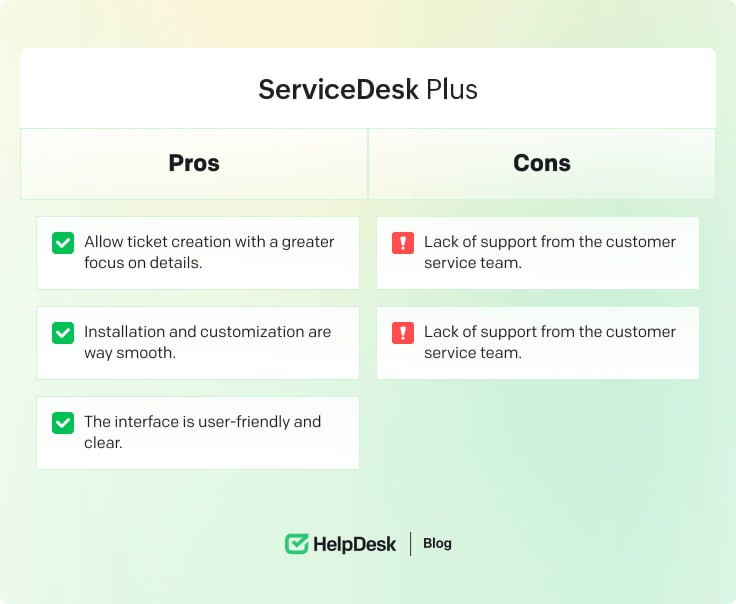
ServiceDesk Plus pricing
A free trial is available for ServiceDesk Plus. But if you want to access more advanced features, expect to pay $1195 monthly for a standard plan offering ten tech and 500 nodes.
Howspace
Howspace facilitates cultural and technical change management processes in an organization. Its simple drag-and-drop interface makes it convenient to plan and implement change.
Managers and other stakeholders are given a visual roadmap that guides them in their step-by-step work to maximize the changes made. The software makes it easy to track the development, planning, organization, and integration of changes to increase team productivity.
The Super Chat widget allows you to collaborate with team members in real time to discuss things within a document or elsewhere in the app.
Key features
-
Drag and drop interface for designing workflows.
-
Send notifications for collaboration with team members.
-
Super chat widget for real-time discussion.
-
Integrate with MS Teams, Zapier, and Miro whiteboards.
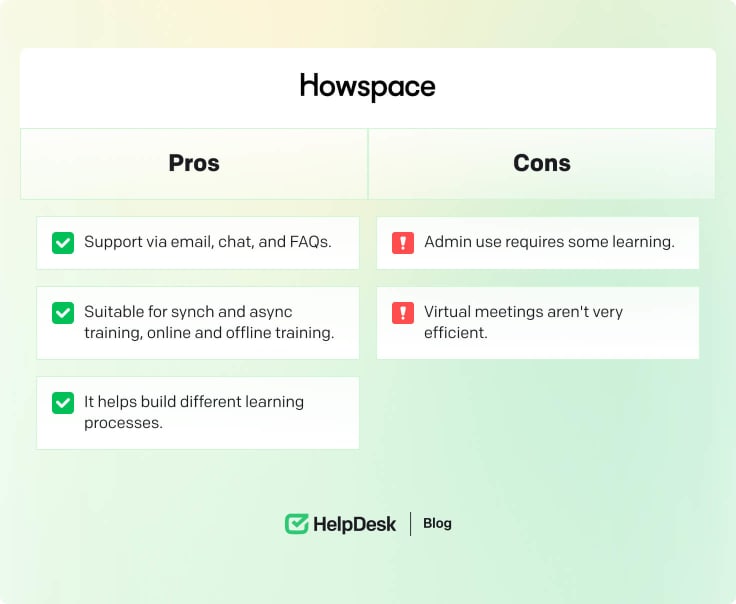
Howspace pricing
There’s a free trial for small teams to experiment with Howspace features. However, the basic plan costs around $13/month per user.
ChangeGear
ChangeGear is another popular platform that is best suited for managers and team leaders. It’s a great help for managing change within your organization, be it through introducing a new policy or integrating new technology.
Management can also use this tool to track and resolve requests and issues. The dashboard clearly shows performance in every process. This change management software is best known for its advanced ML and AI features, which greatly aid decision-making.
Key features
-
Self-service portal for better dealing with common queries.
-
A central repository to store all the changes made by the DevOps team.
-
Easy auditing and compliance reporting.
-
AI and ML capabilities for robust decision-making.
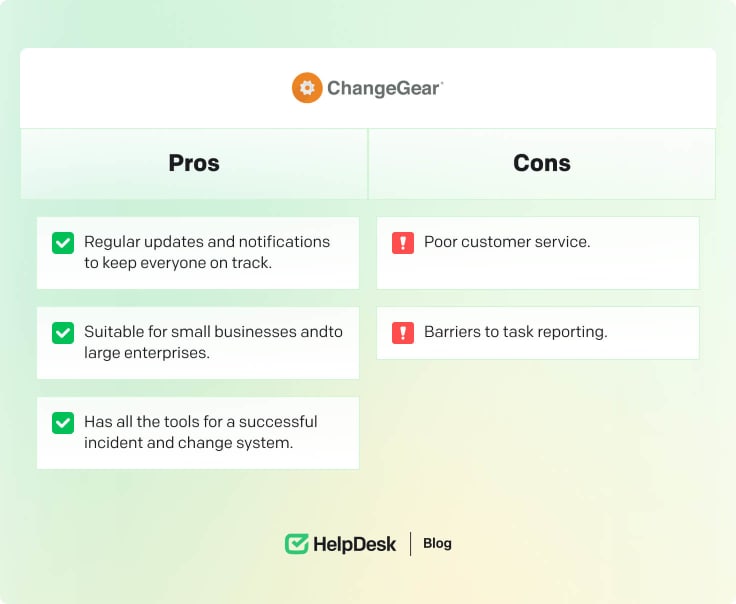
ChangeGear pricing
ChangeGear doesn’t offer its customers a free trial or free plan. The pricing starts from $46/month per user.
ClickUp
ClickUp is a valuable tool with everything – from asset management capabilities to change management. It allows you to set goals with a particular duration so employees can work toward them. In addition, plenty of tracking options allow you to track the progress of a new process or project.
Pre-made templates help you introduce new projects into the existing system without significantly impacting the team’s efficiency. Teams can collaborate via Docs, Chat, Goals, Whiteboards, etc.
Key features
-
Time tracking and four different view plans for change management.
-
Gantt Charts to visualize and manage projects.
-
Custom statuses for each unique project that can be edited, recorded, and colored.
-
Enable data importation from third-party apps.
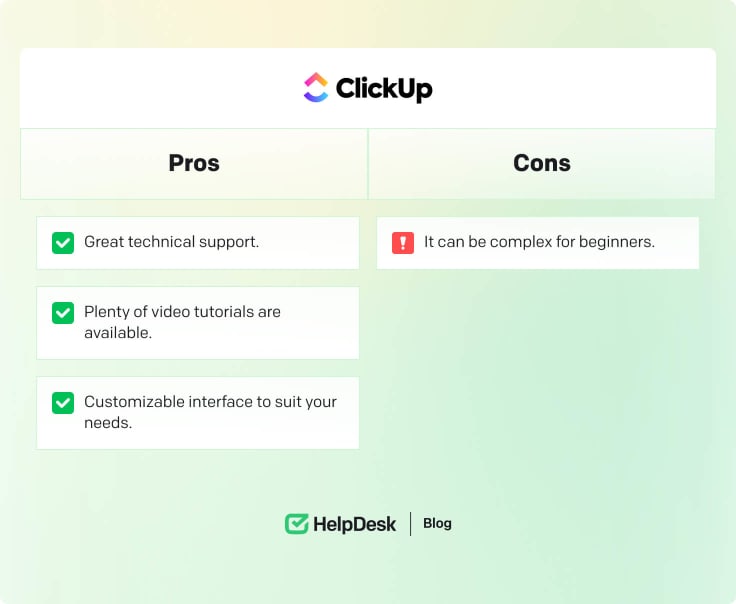
ClickUp pricing
There’s a free trial available for Clickup, and the pricing is also very minimal, starting from $7 for the Unlimited plan.
The Change Shop
The Change Shop claims to be the most helpful workspace change management solution. It has features like analytics and surveys, and tells you how your changes drive results and if there’s room for improvement.
It has a lot of useful tools, from Change Calendar and Change Planning to Prioritization and Task Management, all in one place. It’s a great help in aligning your employees with your business goals to take the organization on the road to success.
Key features
-
Team tools aid in collecting cross-team feedback.
-
Change Simulator to get an idea of possible scenarios and risks.
-
Personal tool to track and rate a change progress.
-
Offers Change Calendar, Change Planning, Prioritization, and Task Management.

The Change Shop pricing
No free trial is available, which means you must pay to benefit from this software. The starting plan starts at $29/month.
ServiceNow
The last option on our list is ServiceNow. This all-in-one solution has pre-built ITSM products to automate and manage numerous IT business services. This change management software manages the virtualization lifecycle and implements new organizational changes.
But this isn’t all – you’ll also come across other features like infrastructure discovery and IT governance. Generating KPIs and getting reports about how your team is adjusting to the change is very easy with ServiceNow.
What truly sets it apart from other applications is that it allows you to share data with others and customize your application. Its AI tools greatly help offer excellent customer experience, using predictive analytics to increase customer satisfaction.
Key features
-
Custom app development and integration.
-
Standardize processes, automate tasks, and customize workflows.
-
Consolidate legacy apps for streamlined IT management and actionable insights.
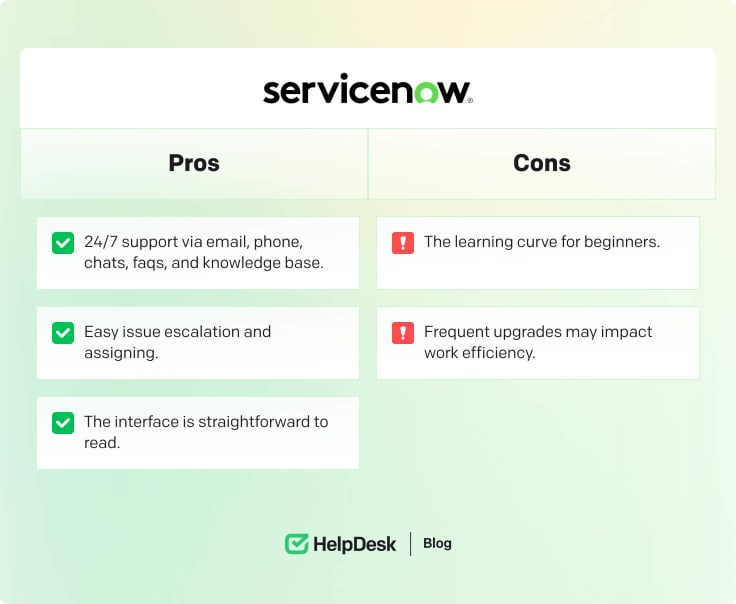
ServiceNow pricing
A free trial is available for ServiceNow, but you have to contact a ServiceNow representative to get an idea of pricing. Share your business details, budget, and goals with them for a suitable plan.
SysAid
SysAid is an all-in-one IT service management (ITSM) platform that integrates change management to help organizations streamline their processes. It offers a centralized solution for managing IT services, automating change request workflows, and tracking approvals. Its powerful incident and problem management capabilities ensure seamless communication between IT teams and stakeholders during the change process.
Key features:
-
Automated workflows for IT and change requests.
-
Centralized ITSM with asset management.
-
Incident and issue management integration.
-
Customizable dashboards and reports.
-
Change request tracking and approval process.
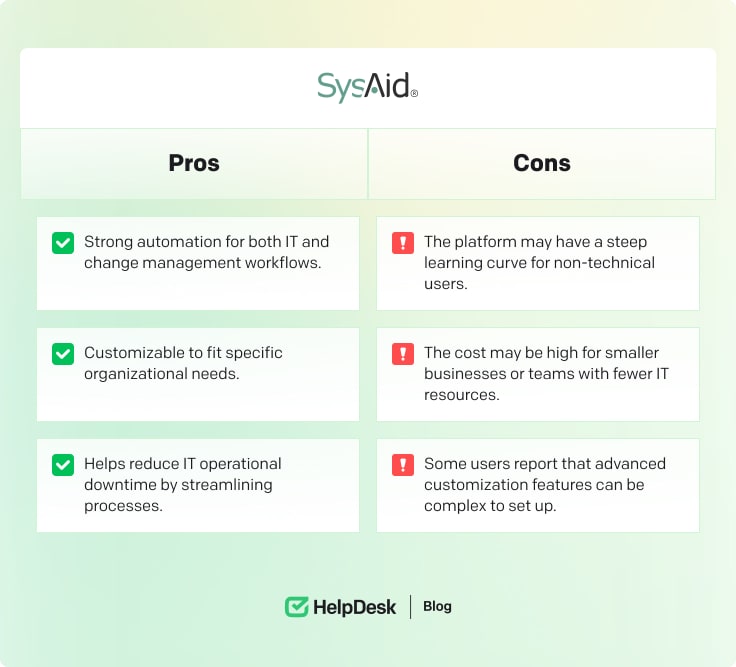
Pricing
SysAid offers custom pricing based on the organization’s size, number of users, and selected modules. Free trials are also available, enabling organizations to test its features before committing.
WalkMe
WalkMe is a digital adoption platform designed to improve user engagement by guiding users through software changes and new processes. It overlays real-time, step-by-step instructions directly within applications, helping employees and customers adapt quickly to changes without extensive training. WalkMe ensures a smooth transition during system upgrades or new software rollouts, making it a valuable tool for change management.
Key features:
-
Step-by-step on-screen guidance.
-
In-app help for faster user adoption.
-
Analytics to track user behavior and software usage.
-
Customizable user flows.
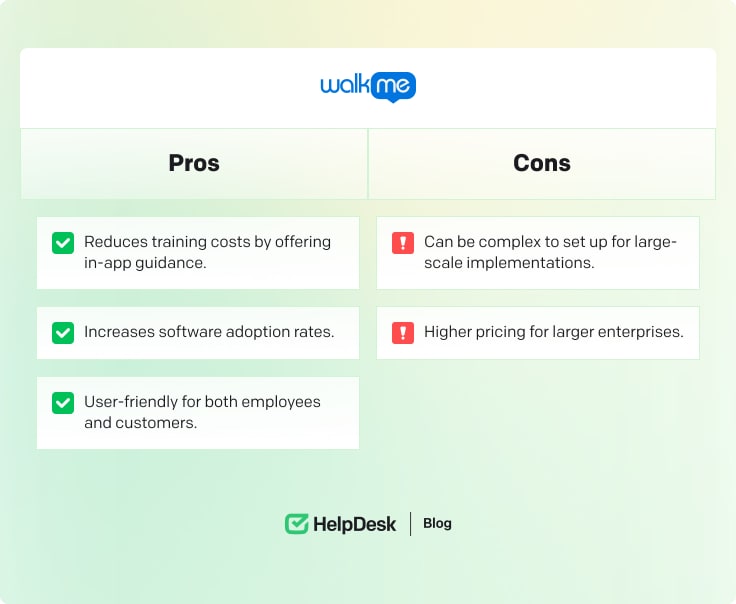
Pricing
WalkMe offers custom pricing based on the organization’s size, needs, and number of users. Pricing varies depending on the features and implementation required, and free trials are available to assess its capabilities.
ServiceNow Change Management
ServiceNow Change Management is an enterprise-grade solution designed to streamline managing IT changes, ensuring they are implemented with minimal risk and maximum efficiency. It integrates seamlessly with other ServiceNow ITSM modules to provide a unified approach to service delivery.
Key features:
-
Change requests are streamlined with automated processes, from submission to approval.
-
Provides built-in tools to assess potential risks and conflicts before executing changes.
-
It visually represents scheduled changes, enabling teams to track, manage, and avoid conflicts in real time.
-
Tracks changes to the configuration management database (CMDB), allowing for more informed decisions.
-
Keeps a detailed history of all changes for audit purposes and regulatory compliance.
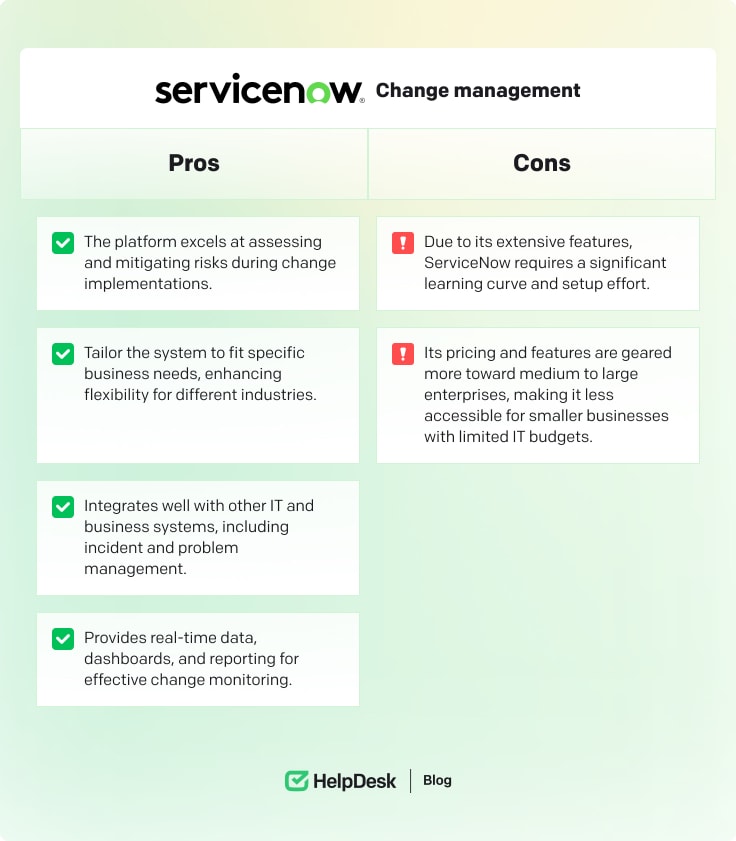
Pricing
ServiceNow operates on a custom pricing model, with costs depending on the organization’s size and specific feature needs. It primarily caters to medium and large enterprises, and pricing is available upon request through ServiceNow’s sales team.
Remedyforce
Remedyforce is a cloud-based IT service management (ITSM) solution built on the Salesforce platform. It’s designed to help organizations streamline their IT operations by combining service desk functionalities with change management processes. Remedyforce allows IT teams to handle change requests efficiently while maintaining compliance and minimizing risk.
Key features:
-
Streamlines change request and approval processes.
-
Provides seamless integration with other ITSM functions.
-
Built-in tools for assessing change risks and impact.

Pricing
Remedyforce offers custom pricing based on the number of users and features. Pricing information can be requested directly from Salesforce.
Choosing the right change management software
Choosing the right change management program can be a daunting task. However, with some consideration, you can select a suitable platform.
Here are a few points that you need to take into account:
-
Organizational goals: First, evaluate your organizational goals. Do you want something for change management or an advanced tool with everything from ticket resolution to change management and tracking? Once you clearly understand your business objectives, look for software with all the necessary features.
-
Existing software ecosystem: You should also consider the compatibility of the new change management platform with your existing workflows and software ecosystem.
-
User feedback: User feedback is vital when choosing change management solutions. So, pay attention to what other customers say about the software’s ease of use, functionality, reliability, and customer support. You can easily get this information via testimonials, reviews, or case studies.
Summary
Change management software is crucial for any modern business. It ensures that all organizational stakeholders are well-informed about any changes implemented and working together to achieve positive results for the company.
Numerous change management platforms are available, such as Helpdesk, Clickup, Giva, Viima, ChangeGear, and The Change Shop. However, you must consider various factors to select the best change management tools option for your business. These factors include user feedback, compatibility of the new software with your existing IT system, and how well it aligns with your business goals.


